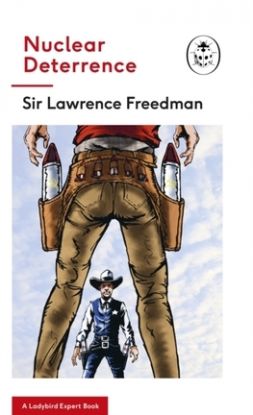Lawrence Freedman
autor
Command
Military command has been reconstructed and revolutionized since the Second World War by nuclear warfare, small-scale guerrilla land operations and cyber interference. Freedman takes a global perspective, systematically investigating its practice and politics since 1945 through a wide range of conflicts from the French Colonial Wars, the Cuban Missile Crisis and the Bangladesh Liberation War to North Vietnam's Easter Offensive of 1972, the Falklands War, the Iraq War and Russia's wars in Chechnya and Ukraine. By highlighting the political nature of strategy, Freedman shows that military decision-making cannot be separated from civilian priorities and that commanders must now have the sensibility to navigate politics as well as warfare.
The Future of War
A new approach to ideas about war, from one of the UK's leading strategic thinkers
In 1912 Sir Arthur Conan Doyle wrote a short story about a war fought from underwater submersibles that included the sinking of passenger ships. It was dismissed by the British admirals of the day, not on the basis of technical feasibility, but because sinking civilian ships was not something that any civilised nation would do. The reality of war often contradicts expectations, less because of some fantastic technical or engineering dimension, but more because of some human, political, or moral threshold that we had never imagined would be crossed.
As Lawrence Freedman shows, ideas about the causes of war and strategies for its conduct have rich and varied histories which shape predictions about the future. Freedman shows how looking at how the future of war was conceived about in the past (and why this was more often than not wrong) can put into perspective current thinking about future conflicts. The Future of War - which takes us from preparations for the world wars, through the nuclear age and the civil wars which became the focus for debate after the end of the Cold War, to present preoccupations with hybrid and cyber warfare - is filled with fascinating insights from one of the most brilliant military and strategic historians of his generation.
Vypredané
29,93 €
31,50 €
Nuclear Deterrence
Part of the new Ladybird Expert series, Nuclear Deterrence is an accessible and authoritative introduction to the deterrent tactics employed to prevent war, drawing on the unprecedented power of nuclear weapons.
Written by celebrated historian and professor of War Studies Sir Lawrence Freedman, Nuclear Deterrence explores the history behind the world's most lethal weapon.
You'll learn the criticism against the development of nuclear weapons, how the shift in global political power from the Cold War to the current arms crisis has shaped defensive strategies, and what implications nuclear weapons bear on the future of warfare.
Written by the leading lights and most outstanding communicators in their fields, the Ladybird Expert books provide clear, accessible and authoritative introductions to subjects drawn from science, history and culture.
For an adult readership, the Ladybird Expert series is produced in the same iconic small hardback format pioneered by the original Ladybirds. Each beautifully illustrated book features the first new illustrations produced in the original Ladybird style for nearly forty years.
Vypredané
9,98 €
10,50 €
A stratégia története
Napjainkban már senki nem gondolja, hogy a stratégia kizárólag haditervek kovácsolását jelenti, s a tábornokok szűk körén kívül mindenki mást hidegen hagy. Bár a görög eredetű kifejezést nyelvújítóink még a ,,hadászat szóval magyarították, a XX. század második felétől világossá vált, hogy a katonák mellett immár sem a politikusok, sem a menedzserek nem lehetnek meg stratégia nélkül. Mi több, a közélet és az üzleti világ az utóbbi évtizedekben szinte kisajátította magának a fogalmat. Ami korábban zseniális hadvezérek harctéri gyakorlatát jellemezte Nagy Sándortól kezdve Caesaron és Attilán át Napóleonig, továbbá Clausewitz korától a hadelmélet gerincét képezte, az az ezredfordulóra a katonai teoretikusok belügyéből egy szinte mindenre ráhúzható, többé-kevésbé ködös ,,tudománnyá vált. Mindazonáltal nemcsak egy NATO-hadművelet vagy egy marxista, esetleg iszlamista forradalom, hanem egy választási kampány sem képzelhető el stratégia nélkül, s épkézláb tervezés híján a társadalmi aktivisták akciói is hamvukba holt kísérletek lesznek. Mint ahogy az üzleti élet ,,farkastörvényei közepette is bajosan tudna talpon maradni az a szűk látókörű kisvállalkozás vagy épp mamutcég, amely lemond a stratégiai elemek rugalmas alkalmazásáról. Lawrence Freedman, akinek a londoni Kings College hadtudományi tanszéke bő három évtizeden át volt szellemi műhelye, a stratégia fejlődéstörténetét kutatva nem csupán Dávid és Góliát történetéig vagy a bibliai Sátán lenyűgöző lázadásáig, hanem egészen a főemlősök viselkedéséig nyúl vissza. Nem habozik megvilágítani a propaganda és a reklámipar módszertanának szoros kapcsolatát sem. Sőt, könyvében terítékre kerül az ókori görögök és kínaiak, valamint a reneszánsz kor izgalmas stratégiafelfogása is, hiszen aligha csoda, hogy ma már Szun-ce és a sokáig félreismert Machiavelli a kedvenc szerzője azoknak a kampánymenedzsereknek, akik elbűvölve találgatják: vajon a politikai és az üzleti játszmák egyes szereplői miért sikeresebbek, mint hasonló adottságú ellenfeleik.
Vypredané
18,35 €
19,32 €
Command
Throughout history, the concept of command -- as both a way to achieve objectives and as an assertion of authority -- has been essential to military action and leadership. But, as Sir Lawrence Freedman shows, it is also deeply political.
Military command has been reconstructed and revolutionized since the Second World War by nuclear warfare, small-scale guerrilla land operations and cyber interference. Freedman takes a global perspective, systematically investigating its practice and politics since 1945 through a wide range of conflicts from the French Colonial Wars, the Cuban Missile Crisis and the Bangladesh Liberation War to North Vietnam's Easter Offensive of 1972, the Falklands War, the Iraq War and Russia's wars in Chechnya and Ukraine. By highlighting the political nature of strategy, Freedman shows that military decision-making cannot be separated from civilian priorities and that commanders must now have the sensibility to navigate politics as well as warfare.







